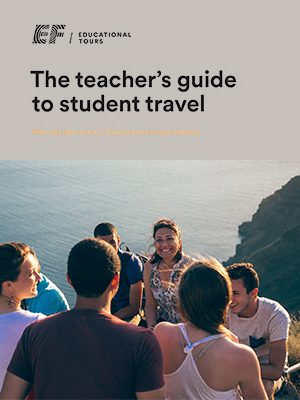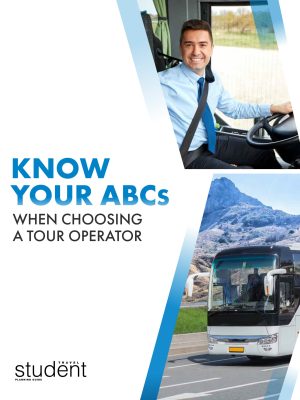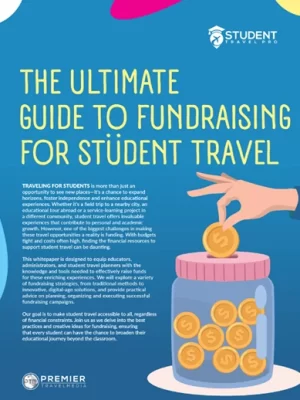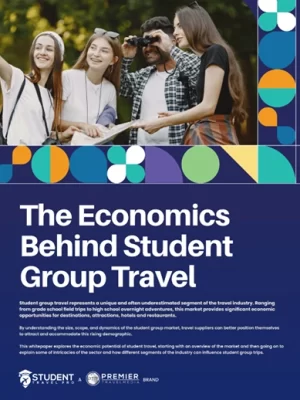Student trip planning is made easy with receptive tour operators, and we show you how with detailed expert advice
Receptive tour operators, usually local companies that specialize in travel planning services within their respective geographic areas, can be an invaluable tool for student group planners when building an itinerary for student trips. They help students better understand the destination and the local amenities that make it special. While haphazardly Googling or using AI to create an itinerary may seem like a viable option, the fine-tuned nuances and crucial details are often overlooked when doing so.
If you enjoy this content, be sure to Subscribe for FREE to the current editions of Student Travel Planning Guide and start crafting your next class trip today.
What Do Student Tour Operators Do?
Here are a few reasons why student trip planners should consider using a receptive tour operator:
- Expert knowledge—Receptive tour operators are experts in the destination and fill the gaps in online research. They provide ideas and deals that will make student trips special. They know the history, intriguing stories, and other interesting facts about the destination. Their wealth of knowledge comes from years of experience and data collected from the feedback from past tours. Receptive operators conduct the same or similar tours many times and continually improve the experience. Whether it’s choosing between different event formats, selecting topics for discussion, or allocating resources effectively, receptive operators provide valuable, often overlooked, insights.
- Logistics—Receptive tour operators know when ticketing is necessary and when tickets become available for booking, thus securing the best available time slots. They also know traffic patterns and the best times to visit various attractions to alleviate crowds and lines. Receptive operators can help identify potential issues or concerns early on, allowing them to be addressed proactively. Logistical challenges often lead to dissatisfaction with the experience, and receptive operators alleviate the challenge and implement solutions before the group knows there is an issue.
- Contacts—Through membership in professional organizations, such as SYTA (Student Youth Travel Association), ABA (American Bus Association) and NTA (National Tour Association), receptive tour operators have the personal connections and relationships necessary for a seamless experience. They know who is on the other end of the phone if an issue should occur.
- Value Added—Often, by utilizing their contacts, receptive operators can provide value-added activities or events to student trips at no additional cost. These are inclusions that groups are not able to get on their own, like a behind-the-scenes tour, early entry or a private talk from a significant person.
- Customization—Receptive tour operators enable planners to tailor events or activities to better suit the preferences and interests of the group members. By understanding what participants want or expect, receptive tour operators can create more personalized experiences that are likely to resonate with the students.
- Convenience—Rather than having to make countless phone calls to local hotels, attractions and restaurants, student trip planners can lean on the expertise of the receptive who does all the work and guides the group through the journey from beginning to end.
- Value—Receptive tour operators often receive discounted rates from hotels, restaurants, theaters and other attractions, allowing them to offer student group planners better rates for specialized products and top-of-the-line service. This added to the cost of time and labor for planning, operating, and accounting of the tours, is a significant overall saving.
- Insurance—In today’s environment, liability insurance, as well as errors and omissions, are extremely important. Student travel planners need to understand and be comfortable with the personal liability that is involved in conducting the tour themselves.
- Pre-check hotels—This is especially important on multi-bus tours. Receptive tour operators are the student group planner’s boots on the ground. They arrive at the hotel prior to the group, obtain the keys from the front desk and make sure check-in is fast and efficient.
- Variety—By utilizing the services of a receptive tour operator, student planners can offer more destinations and sell more tours because they already have a professional team of tour planners, operations associates and guides as part of their team.
How to Find a Receptive Tour Operator for Student Trips
So how do you find a quality receptive tour operator for student trips? This involves thorough research, careful consideration of factors like safety, educational value and affordability, and seeking recommendations from reliable sources. Here are some steps to help you find a reputable, receptive tour operator.
- Research Online and Check Credentials—Start by researching receptive tour operators online. The SYTA website is a good place to start. Look for companies that specialize in student group travel and have experience organizing educational trips. Websites, review platforms, and social media can be valuable resources for gathering information about different operators. Look for tour operators who are members of reputable organizations such as SYTA, ABA and NTA. Membership in these organizations often signifies a commitment to quality and professionalism.
- Read Reviews—Pay attention to reviews and testimonials from other educators, schools, or organizations that have used the tour operator’s services in the past. Positive reviews can provide insights into the operator’s reliability, safety record and the overall quality of their tours.
- Evaluate Safety Measures—Safety should be a top priority when choosing a tour operator for student groups. Inquire about the operator’s safety protocols, including their procedures for emergency situations, supervision of students and transportation safety standards.
- Assess Educational Value—Consider the educational value of the tours offered by the operator. Look for programs that align with curriculum objectives and provide meaningful learning experiences for students. Ask about educational resources, guided tours, and interactive activities that enhance the learning experience.
- Compare Itineraries and Inclusions—Review sample itineraries and the range of services included in the tour packages offered by different operators. Compare prices but remember to look at other important aspects. Make sure to compare the quality of the accommodation, meals, transportation options and any additional activities or attractions included in the tour.
- Request References—Don’t hesitate to ask the tour operator for references from other schools or organizations that have used their services. Contacting references directly can provide valuable insights and help you make an informed decision.
- Consider Customer Service—Assess the level of customer service provided by the tour operator. Responsive communication, attention to detail, and willingness to address your questions and concerns are indicators of a reliable and customer-focused operator.
- Seek Recommendations—Ask colleagues, fellow educators, or school administrators for recommendations. Personal referrals from trusted sources can help you identify reputable tour operators with a proven track record of delivering quality experiences for student groups. You can also ask for referrals from local CVBs where you’re visiting since they are always a great area resource.
- Request a Proposal—Once you’ve narrowed down your options, request a detailed proposal from the tour operators you’re considering. Review the proposal carefully, and don’t hesitate to ask for clarifications or modifications to ensure that the tour meets your specific needs and preferences.
Integrating receptive operators into the planning process can help educators create more engaging, relevant, and successful tours by leveraging the collective wisdom with the preferences of each individual group. By following these steps and conducting thorough research, student group planners can find a quality receptive tour operator that offers safe, educational and memorable experiences.
Did you enjoy this article? Discover more student travel insights with your FREE Subscription to Student Travel Planning Guide.
By Sue Arko, Contributing Writer








